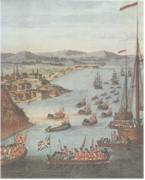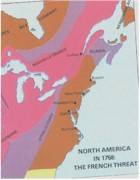 |
The name of Sir Walter Raleigh and his
efforts to found the colony in Virginia in the 1580s,
named after Elizabeth I, brought the American colony to
prominence at court in London. Then there was the
voyage of the Pilgrim fathers in the Mayflower in 1620.
But all in all the American colony was not a major factor
in British life.
|
 |
It was only in the middle of the 18th century that
the bitter quarrel over tax emerged as a major problem.
Riots resulted , George III became more and more
repressive. Finally the British governments concession
for the East India Company to sell tea directly to the
colonists, resulted in the merchants, who would have been
bankrupted by the action, tipping the entire cargo of
£10000 worth of tea into Boston harbour. The british
reaponse was to declare martial law, which led to further
riots and eventually to rebellion. The colonists declared
independence in 1776 at Philadelphia |
| The British army and their weapons were ill suited to guerilla warfare,
and Cornwallis's surrender of his army of 3700 men at Yorktown was effectively
the end of the war |
|
| From the British point of view the whole thing
was an unmitigated disaster. The army was 3000 miles from home, and difficult
to supply. The British navy temporally lost control of the sea to the French.
And the two British commanders, Cornwallis and Clinton, quarrelled over
how to conduct the campaign. Even in Britain the political parties were
not united on who to support, with the Whigs attacking the king for his
tyranical rule.
The British suffered their first major
defeat for centuries, and retreated to continue
controling Canada, leaving the American Colonists to
their new country
|
| |
|


